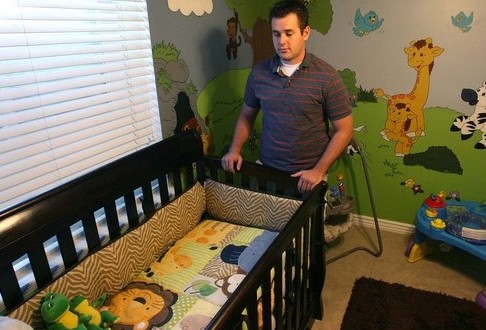Jake Strickland in Utah is fighting for a son he never had the chance to set his eyes on. A son who was given away in adoption keeping him in the dark. The worst part of the story is that Utah’s laws do not recognize the rights of unmarried fathers like Strickland. In this case, the mother was a married woman – who concealed that fact to Strickland – and the de jure father was possibly too happy to give away the infant of the de facto father in adoption.
Attorney Wes Hutchins is representing Strickland both in the federal lawsuit and in an action pending in the Utah Court of Appeals. The lawsuit, says Hutchins, is making “an effort to hold everyone accountable for the conspiracy to defraud Jake.”
The lawsuit hinges on the story of Strickland, who claims the woman with whom he fathered a child lied to him about her plans for the child until the day before the boy was born. But Hutchins said he pointed to other cases of alleged fraud in the lawsuit as well to demonstrate that the birth mother’s fraud was part of what he claims is a larger pattern found among adoption agencies and attorneys in the state.
“It’s really an issue of accountability,” Hutchins said. “With these fraudulent adoption schemes you find that they are fraudulent, there are co-conspirators involved — most notably adoption attorneys, adoption agencies and adoptive mothers that are engaged in an enterprise,” he said. “We’ve cited those other cases as a necessary element to RICO (Racketeering Influenced and Corrupt Organizations Act) to show a pattern of unlawful conduct.”
Strickland fathered a child with a woman who was married but estranged from her husband. The woman said she was considering an adoption, but Strickland stated numerous times that he wanted the child and would care for it by himself if necessary, the lawsuit states.
The baby was born, unbeknownst to Strickland, on Dec. 29, 2010. Just over 24 hours later, the birth mother signed documents relinquishing her parental rights.
Strickland had been told by the birth mother that the baby would be delivered by C-section on Jan. 12, 2010. But on Jan. 5, 2010, the birth mother told Strickland in a cellphone conversation that she had placed the baby with an adoptive couple, according to the lawsuit.
Strickland initiated a paternity claim the following day. He had not, however, registered with Utah’s putative father registry during the pregnancy.
Strickland later learned that the woman was not legally divorced from her husband, according to press reports. Under the state Judicial Code, a married woman’s husband is presumed to be the father of her child.
According to the lawsuit, a social worker pressured the woman’s husband to relinquish his parental rights and allow the adoption to proceed. Hutchins said she even threatened the man after he mentioned Strickland, telling him that if he didn’t keep quiet he would be stuck with child support payments.
He also alleges that attorneys David Hardy and Larry Jenkins failed to inform the adoption court about a stipulation in a paternity case recognizing Strickland as the biological father and left the man in the dark about proceedings as they “rushed” the adoption. He said he and Strickland are seeking $30 million for what Strickland lost in being able to raise and enjoy his child.
The $100 million is “an amount specifically designed to serve as a deterrent to this kind of conduct,” Hutchins said. “Under the Utah Adoption Act you can commit fraud and it is not a basis to overturn an otherwise illegal adoption, you can sue for damages. … So you can’t get your child back if there’s a fraudulent adoption, but you can get money.”
The attorneys in the suit with Kirton McKonkie declined to comment, as did LDS Family Services. But Sen. Todd Weiler, R-Woods Cross, said Strickland had an attorney who told him to follow Utah law and register as the father.
Weiler said he knows of the Strickland family and is sympathetic. He has heard Strickland’s mother testify at the Utah Legislature and has met with her.
“It’s a tragic story and she feels that she lost her grandchild and my heart goes out to her, but the protections there in the law were there and they weren’t followed,” Weiler said, emphasizing the ease of registering for paternity in the state.
“His rights would have been protected if he would have just followed the advice of his own attorney,” Weiler said. “The lawsuit takes a shotgun approach against a lot of good people and a lot of good entities that are doing lot of good. … It appears to me that they’re trying to blame everyone except for the responsible party.”
He said he is aware of pending lawsuits alleging injustices for unwed fathers in Utah, but said they don’t justify a serious change in the law. He noted that he is an attorney who has personally handled more than 100 adoptions.
“I’m not convinced that a dramatic change needs to take place, because when we make a change it affects tens of thousands of adoptions and what we’re looking at in this lawsuit and a few other high-profile lawsuits are one or two bad examples out of 10,000,” he said. “I don’t think it’s good policy for the state to look at one or two exceptions and say, ‘Let’s change the laws for everyone.'”
Agencies
 Canada Journal – News of the World Articles and videos to bring you the biggest Canadian news stories from across the country every day
Canada Journal – News of the World Articles and videos to bring you the biggest Canadian news stories from across the country every day



